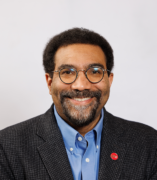
Michael K. Thomas, PhD
Associate Professor
Educational Psychology
Contact
Building & Room:
3533 ETMSW
Address:
1040 W. Harrison St. (MC 147), Chicago, IL 60607
Office Phone:
Email:
About
Michael K. Thomas is an associate professor in the Department of Educational Psychology at the University of Illinois at Chicago. His research focuses the cultural dimensions of technology implementation in learning contexts and what this means for the design of technology-rich innovations for learning. Three key questions with respect to this are (a) What are the central concerns of teachers, trainers, and other stakeholders regarding the implementation of technology in learning contexts? (b) What do they do to continually resolve these concerns? and (c) In what ways does culture play a role in the design and implementation of technology-rich innovations? He is particularly interested in video games and gameification in learning environments. He has expertise in qualitative research in general and grounded theory in particular. Before joining, UNCC, he taught instructional technology and research methodology at the University of Oklahoma, the University of Wisconsin-Madison, and the Univerisyt of North Carolina, Charlotte. He has also been an ESL/EFL teacher in New York City Public Schools and has taught overseas.
Selected Grants
National Science Foundation, The Secure and Trustworthy Cyberspace (SaTC) Program), EDU: CySec: A Cybersecurity Collectable Card Game for Children, PI
Selected Publications
Thomas, M. K. & Lubin, I. (2021). Making Culture Visible: A Primer for Culturally Grounded Design. In I. Lubin (Ed.), ICT and International Learning Ecologies: Representation and Sustainability Across Contexts (pp. 87 –108), Routledge. ISBN 9780367363673
DeVoto, C. & Thomas, M. K. (2020). Cultural Sense-making and the Implementation of edTPA Technological Tools: Lessons for the Field. Educational Technology Research and Development, 68, 2729–2751. DOI: 10.1007/s11423-019-09732-w
Thomas, M. K. Shjyka, A., Kumm, S. & Gjomemo, R. (2019). Educational Design Research for the Development of a Collectible Card Game for Cybersecurity Learning. Journal of Formative Design Learning, 3(1), 27-38.
Al-Jarrah, A., Thomas, M. K. & Shehab, M. (2018). Investigating temporal access in a flipped classroom: Procrastination persists. International Journal of Educational Technology in Higher Education, 15(1), 1-18.
Thomas, M. K. (2017). Nuancing: Fidelity and Flexible Adaptivity in the Implementation of Technology-Rich Innovations. i-Manager’s Journal of Educational Technology, 13(4), 20-34.
Thomas, M. K. (2017). Globalization, Ironic Binaries, and Instructional Technology: Toward the emergence of a robust critical theory of technology. In A. Benson, R. Joseph, & J. L. Moore (Eds.), Culture, Learning and Technology: Research and Practice (pp. 44-57). New York, NY: Routledge.
Thomas, M. K. & Yang, W. L. (2013). Neoliberalism, Globalization, and Creative Educational Destruction in Taiwan. Educational Technology Research and Development, 61(1), 107-129.
Thomas, M. K. & Liu, K. (2012). The Performance of Reflection: A Grounded Analysis of Prospective Teachers’ ePortfolios. Journal of Technology and Teacher Education 20(3), 305-330.
Thomas, M. K. (2011). The utility and efficacy of qualitative research software in grounded theory research. In V. B. Martin & A. Gynnild (Eds.), Grounded theory: The philosophy, method, and work of Barney Glaser (pp. 133-146). Boca Raton, FL: BrownWalker Press.
Thomas, M. K. & Nayan, R. (2011). Smart Schools for Saving the Soul: A juxtaposition of neofundamentalist and neoliberal discourse concentrations in contemporary Malaysia. Discourse: Studies in the Cultural Politics of Education, 32(4), 513-529.
Education
PhD, Instructional Systems Technology, Indiana University
PhD, Language Education, Indiana University
Research Currently in Progress
Thomas' research focuses the cultural dimensions of technology implementation in learning contexts and what this means for the design of technology-rich innovations for learning. He is also interested in the philosophical dimensions of educational research and methodology. He teaches courses in Qualitative Research, Inquiry, and Qualitative Data Analysis.